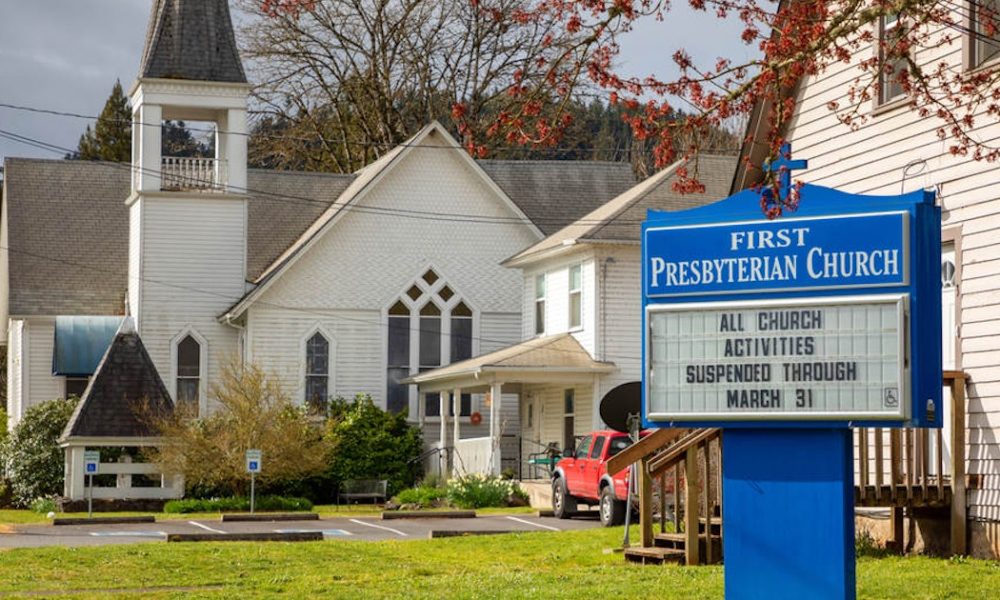 Signs of the COVID-19 pandemic are evident throughout the area. Above, painted rocks promoting cleanliness with a silly twist are crafted by Jenni Donley and hidden around town, and houses of faith are closed to group gatherings. Mike Nordtvedt/Lifeslice Photography
Signs of the COVID-19 pandemic are evident throughout the area. Above, painted rocks promoting cleanliness with a silly twist are crafted by Jenni Donley and hidden around town, and houses of faith are closed to group gatherings. Mike Nordtvedt/Lifeslice Photography
In this ”new reality” with the Coronavirus, every day is in flux.
Restrictions that were put in place last week have since tightened. Entrepreneurs that created impromptu alt-business plans last week have folded. Normalcy during a pandemic is nonexistent; now, it’s about trying to get through each day.
Gov. Kate Brown on Monday directed Oregonians to stay home, closing certain businesses, requiring social distancing, implementing restrictions on childcare and workplaces and limiting outdoor recreation.
The City of Springfield declared a State of Emergency on March 16. Creswell declared a State of Emergency on March 23. Cottage Grove City Manager Richard Meyers said there is ”no need yet” to declare an emergency in the Grove.
”We are monitoring our activities and functions and see no need yet to declare an emergency,” Meyers said. ”If we need to do something that would be outside our normal authority, change procurement procedures, change fees or give the city manager emergency authority outside City code, we would do it.”
A State of Emergency allows cities to more effectively respond to the crisis and be eligible for state and federal reimbursement.
”For example, we temporarily exempted PeaceHealth from permit requirements so they could locate emergency medical facilities at Riverbend,” Springfield Mayor Christine Lundberg said.
During this State of Emergency, cities may take legal and necessary steps to respond and recover, including requesting assistance, funds and reimbursement from the State and federal agencies; adopting temporary rules and policies; and entering into contracts for services and aid agreements.
Critical services remain available through the stay-home order, though those whose businesses are considered nonessential are finding their finances in dire straits.
Seth and Melissa Clark, owners of Blue Valley Bistro, are teetering on the edge of filing for bankruptcy and stripping the business to the bones in hopes of a miracle, Seth said.
The fledgling Coburg location closed down this week. Clark said that location ”was pushing about a 50% loss of business. That, coupled with the fact that we were still growing in that location, was too much to bear. We were losing a little over $1,000 a week.”
It’s pretty bad timing, Clark said. ”We bootstrapped our expansion into Coburg, accruing a mountain of debt on the belief that we could grow that business into a prosperous entity,” Clark said. ”I knew it would be a long road to success, but I wasn’t prepared to take a 50% hit to sales virtually overnight.”
The Clarks this week laid off 10 employees, and was ”the toughest decision I’ve made in my life,” he said. The Creswell location has taken about a 20% hit to sales. With reduced payroll, the Clarks hope that location can still be profitable through the pandemic.
Right now, success to the Clarks looks like making it to next month and covering the bills. ”Our plan is for Melissa and I to run the shop as long as we can,” Clark said. ”We have to scale back to just five days a week and have a pared-down menu, but we’re going to give it a go as a last-ditch effort to salvage our business.”
Springfield Chamber of Commerce President and CEO Vonnie Mikkelsen said the response from the business community having to readjust has come from all sectors and sizes, and that the intensity of Chamber advocacy efforts have since ramped up significantly.
”We’ve fielded every kind of call you might imagine,” she said. ”We are problem-solving as we can, and sharing these stories with policymakers to advocate for relief for businesses, workers and families,” she said.
Knowing that state and federal relief packages would be weeks in the making and that small businesses need assistance immediately, Mikkelsen said that last week the Springfield Chamber coordinated with the county and Springfield and Eugene cities to establish a bridge fund, a model that other counties are eyeing to replicate.
”I’ve been actively engaged with our state chamber executives, legislative counsel, and as the Oregon State Chamber of Commerce board chair to ensure proactive representation of our small and medium-sized businesses are included in the asks to the Governor’s office and to the Joint Special Committee on Coronavirus Response as well as the Governor’s economic policy advisory.”
”Every day is different, and swift action is almost always required,” Mikkelsen said. ”Our community at large is always top of mind; their needs determine my priorities. This has certainly provided clarity and focus on priorities and values. It has demanded a well-balanced competency set in crisis and change management.”
That newfound clarity and focus surrounding the Coronavirus from a management standpoint also extends to local farmers, said Erica Trappe, owner of Good Food Easy, which participates in a Community Supported Ag program (CSA).
”Now is a good illustration of why it’s important to support local farming, for crises like this, or the Cascadia earthquake which could happen at any time,” Trappe said. ”Big chains will start to break down and we will be stuck with what we have locally.”
She said if people don’t longterm support local farms, they won’t be here to support the community when in need.
”If all local farms go out of business because of the cheap produce being bought from China and Mexico, there won’t be a food system in the community,” Trappe said. ”Having a healthy food system is local sources like vegetables and eggs – whether virus or heartbreak and the trucks stop hauling food across the country – we have food you can get here. Can’t let local farms wither and die; they need to be there all the time so that they are there when needed.”







